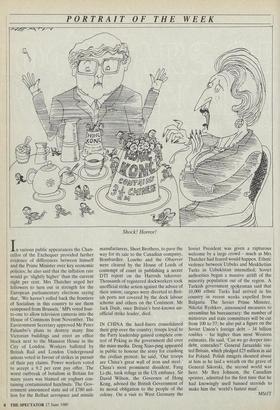PORTRAIT OF THE WEEK
Shock! Horror!
In various public appearances the Chan- cellor of the Exchequer provided further evidence of differences between himself and the Prime Minister over key economic policies; he also said that the inflation rate would go `slightly higher' than the current eight per cent. Mrs Thatcher urged her followers to turn out in strength for the European parliamentary elections saying that, 'We haven't rolled back the frontiers of Socialism in this country to see them reimposed from Brussels.' MPs voted four- to-one to allow television cameras into the House of Commons from November. The Environment Secretary approved Mr Peter Palumbo's plans to destroy many fine Victorian buildings and erect an office block next to the Mansion House in the City of London. Workers balloted by British Rail and London Underground unions voted in favour of strikes in pursuit of their pay claims. Power workers voted to accept a 9.2 per cent pay offer. The worst outbreak of botulism in Britain for many years was blamed on yoghurt con- taining contaminated hazelnuts. The Gov- ernment announced state aid of £780 mil- lion for the Belfast aerospace and missile manufacturers, Short Brothers, to pave the way for its sale to the Canadian company, Bombardier. Lonrho and the Observer were cleared by the House of Lords of contempt of court in publishing a secret DTI report on the Harrods takeover. Thousands of registered dockworkers took unofficial strike action against the advice of their union; cargoes were diverted to Brit- ish ports not covered by the dock labour scheme and others on the Continent. Mr Jack Dash, once Britain's best-known un- official strike leader, died.
IN CHINA the hard-liners consolidated their grip over the country; troops loyal to the Party leadership gained complete con- trol of Peking as the government did over the mass media. Deng Xiao-ping appeared in public to honour the army for crushing the civilian protest: he said, `Our troops are China's great wall of iron and steel.' China's most prominent dissident, Fang Li-zhi, took refuge in the US embassy. Sir David Wilson, the Governor of Hong Kong, advised the British Government of its moral obligation to the people of the colony. On a visit to West Germany the Soviet President was given a rapturous welcome by a large crowd — much as Mrs Thatcher had feared would happen. Ethnic violence between UzbekS and Meskhetian Turks in Uzbekistan intensified; Soviet authorities began a massive airlift of the minority population out of the region.. A Turkish government spokesman said that 10,000 ethnic Turks had arrived in his country in recent weeks expelled from Bulgaria. The Soviet Prime Minister, Nikolai Ryzhkov, announced measures to streamline his bureaucracy: the number of ministries and state committees will be cut from 100 to 57; he also put a figure on the Soviet Union's foreign debt — 34 billion roubles — far higher than most Western estimates.. He said, `Can we go deeper into debt, comrades?' General Jaruzelski visi- ted Britain; which pledged £25 million in aid for Poland. Polish émigrés shouted abuse at him as he laid a wreath on the grave of General Sikorski, the second world war hero. Mr Ben Johnson, the Canadian sprinter, admitted for the first time that he had knowingly used banned steroids to make him the `world's fastest man'.
MStJT


















































 Previous page
Previous page